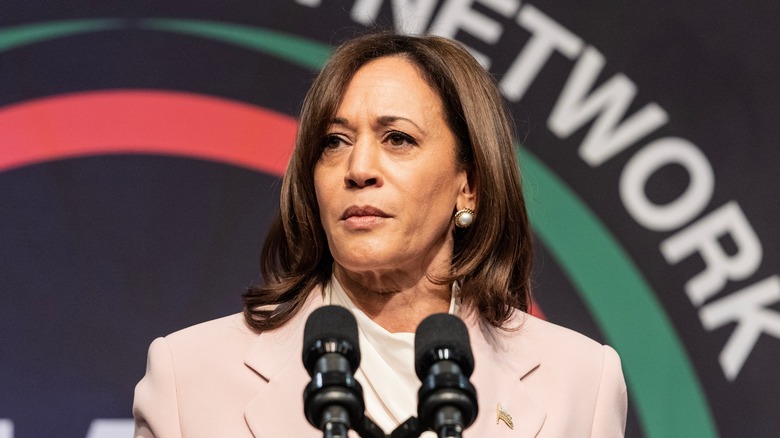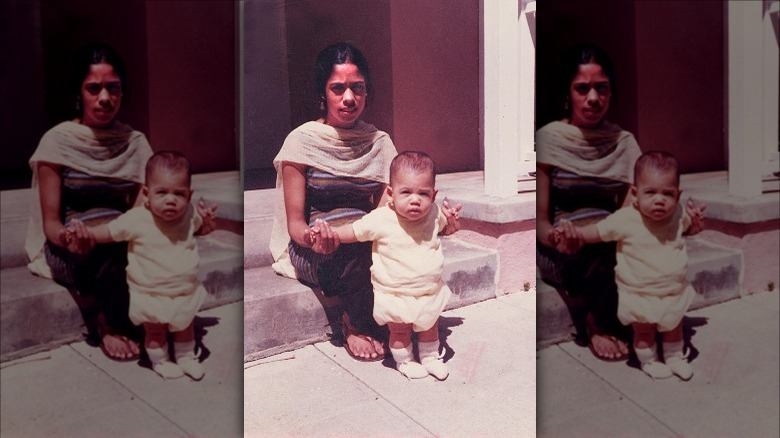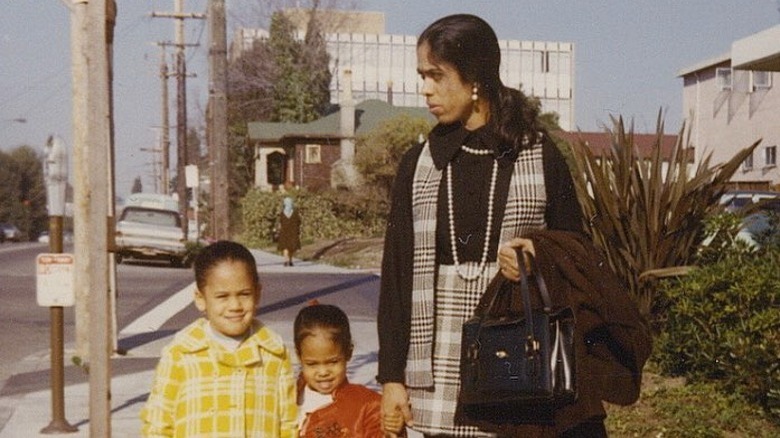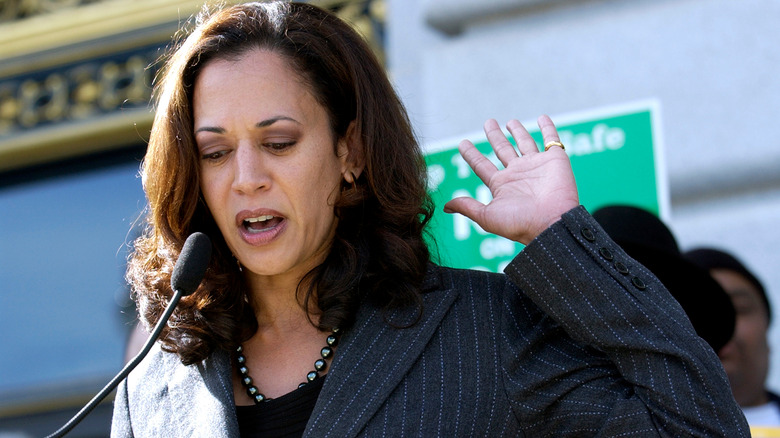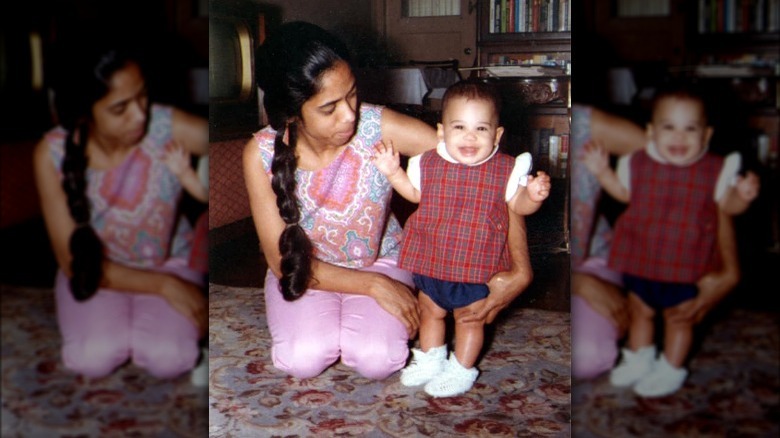Heartbreaking Details About Kamala Harris
Since becoming the first woman, Black American, and South Asian American elected vice president in 2021, Kamala Harris has continued to make history. Though the former California senator has solidified her reputation as a barrier-buster, her victories have been hard-won. From growing up in the shadow of segregation to the death of multiple family members, she has had to navigate many trials. Yet, this did not stop Harris from forging an impressive career, even before entering politics.
"I think it's really important for America to just have further evidence of the breadth and depth of what women are and what we can do," Harris told People in mid-2020. "It is worth it, but it is not without sacrifice and not without pain." The pain she has experienced extends beyond her life as a public figure and into the realm of the personal, taking the form of challenges and losses to which people of multiple backgrounds can relate.
Kamala Harris' parents divorced before she turned 10
Kamala Harris' mother, Shyamala Gopalan, and her father, Donald Harris, hit it off during their time at the University of California, Berkeley. The pair had much in common, including moving to the U.S. from their native countries (India and Jamaica, respectively) to continue their post-secondary educations. Yet, following their marriage and the birth of their two daughters, their connection began to fray. "In time, things got harder. They stopped being kind to each other. I knew they loved each other very much, but it seemed they'd become like oil and water," Kamala wrote in her memoir, "The Truths We Hold."
Shyamala and Donald separated when Kamala was five. During this period, the children lived with their mother, though they continued to spend time with their father on weekends and during seasonal trips. However, the situation changed after the pair divorced. "This early phase of interaction with my children came to an abrupt halt in 1972 when, after a hard-fought custody battle in the family court of Oakland, California, the context of the relationship was placed within arbitrary limits imposed by a court-ordered divorce settlement based on the false assumption by the State of California that fathers cannot handle parenting," Donald wrote in an essay for Jamaica Global.
Despite the ruling, Donald remained in his daughters' lives. However, Kamala expressed in her memoir that the relationship between her parents remained strained. She even worried that her mother would skip her high school graduation to avoid seeing her father.
Racism has impacted Kamala Harris since early childhood
As a public figure, Harris has had to weather a massive amount of vitriol. "Research shows that Kamala Harris may be the most targeted American politician on the internet, one who checks every box for the haters of the fever swamps: She's a woman, she's a person of color and she holds power," the Los Angeles Times reported in 2021. Some of these attacks center on her status as a minority, while others have accused her of not being "Black enough."
Harris has long had to contend with this variety of discrimination. Born in 1964, she grew up in the aftermath of the 1954 Supreme Court case that made segregation in schools illegal. However, the ruling was by no means an instant fix. Speaking to the LA Times, Harris recalled the divisions she faced as a child while visiting her father in Palo Alto. "The neighbors' kids were not allowed to play with us because we were black," she stated. "We'd say, 'Why can't we play together?' 'My parents — we can't play with you.'"
As Harris grew older, this separation, and her part in bridging it, manifested in other ways. "I only learned later that we were part of a national experiment in desegregation with working-class black children from the flatlands being bused in one direction and wealthier white children from the Berkeley hills bused in the other," she detailed in her memoir.
Kamala Harris faced the loss of her grandfather just as her political career took off
P.V. Gopalan, himself an Indian civil servant, inspired his granddaughter in more ways than one. Despite prevailing gender norms in the country, he encouraged his unmarried daughter, Shyamala, to travel to the United States to further her education. "Shyamala was quite definitely influenced by my father, and she in turn had a great influence on Kamala," G. Balachandran, Harris' uncle, told the Los Angeles Times.
Harris described her maternal grandfather as "one of my favorite people in my world." The pair fostered their close relationship in person during her trips to India and long distance. "My grandfather felt very strongly about the importance of defending civil rights and fighting for equality and integrity," she shared, highlighting the clear parallels between Gopalan and her own approach to politics. He died in 1998, the same year Harris became assistant district attorney in San Francisco.
Kamala Harris' mother died of cancer in 2009
As a mostly single parent, Shyamala Gopalan had a major impact on her daughter's life. "Like so many mothers, she worked around the clock to make it work, packing lunches before we woke up and paying bills after we went to bed, helping us with homework at the kitchen table and shuttling us to church for choir practice," Harris shared in a 2020 DNC speech (via Today). "She made it look easy, though it never was."
Gopalan dedicated her career to researching breast cancer, only to die of colon cancer at the age of 70. Prior to her death, she expressed the desire to return to India. Though her mother could not complete the trip while still alive, Harris honored Gopalan's wish by traveling to the country and scattering her ashes in the ocean. "It was a shock when she told us in 2008 that she herself was diagnosed with colon cancer—and a great sadness when she passed away a year later," Harris wrote in a Facebook post. "My mother was the first person to tell me that my thoughts and experiences mattered," she shared in another status update the following year.
